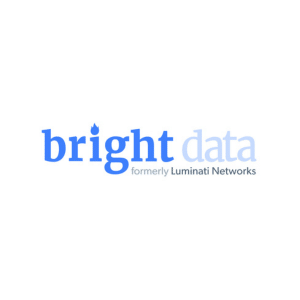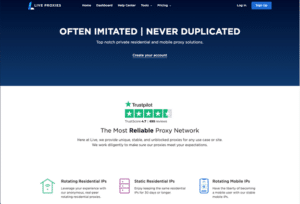Best for Small Businesses
Are you seeking the best proxy server to integrate into your strategy this year?
There are tons of different proxies on the market. Deciding the best one can feel like a blind chess game without proper research.
I’m Hanna. I have over a decade’s worth of marketing experience under my belt, and in that time, I’ve tested and used each proxy I’m going to review in this list.
Whether you’re looking to grow a new account or efficiently collect data quickly, the proxies on this list are reliable and top-performing.
So without further ado, let’s get started!
Geonode
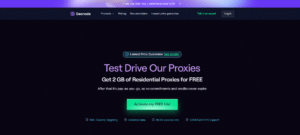
What is Geonode?
Geonode is a developer-friendly proxy service provider that allows for seamless and secure browsing. They offer Unlimited Residential Proxies, and Pay as you go Residential and Scraper APIs, as well as other free tools.
Geonode Features
30,000,000+ Proxies
Unlimited data
160+ country targeting
SOCKS5/HTTPS Support
99.9% success rate
Geonode Pricing
Starts at $49/month, from 10 to 3,000 concurrent requests for Unlimited Residential Proxies. Great for large web scraping projects.
Starts at $4/GB, from 1GB to 5TB for Pay as you go Residential Proxies. For full control.
Starts at $4/GB, from 1GB to 5000GB at 100 concurrent requests for Pay as you go Scraper. Great for easy web scraping.
Their free tools include:
Free Proxy List – for thousands of free proxies.
What’s my IP – provides detailed information about your IP and internet connection.
Proxy Checker – to easily bulk check proxies and see which ones are alive/dead.
Geonode Pros and Cons
Geonode Pros
– Unmetered bandwith
– Country targeting
– Developer-friendly
– Affordable
Geonode Cons
– No free trial
Bright Data
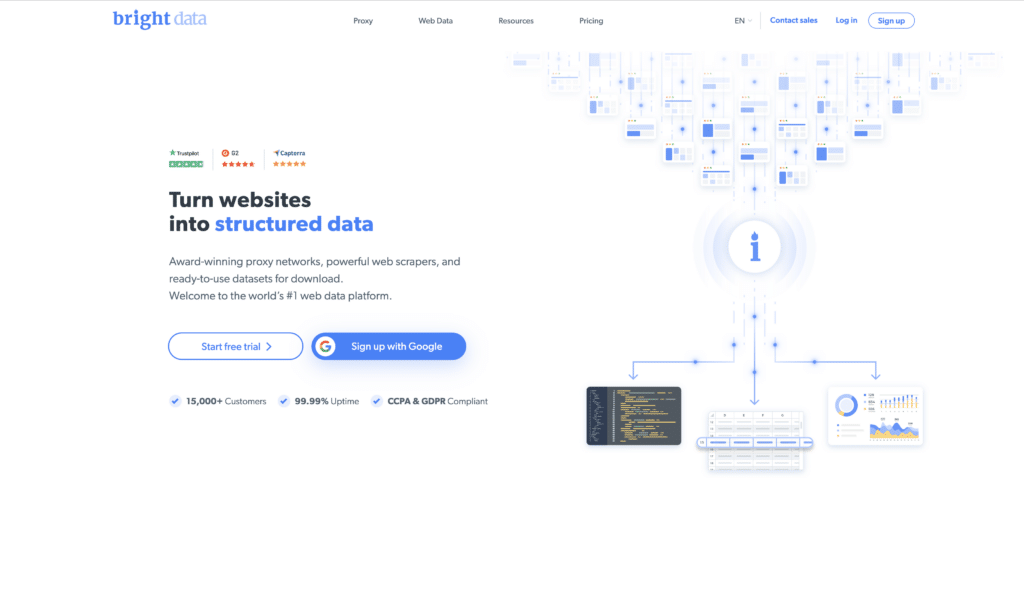
What is Bright Data?
Bright Data is a one-stop proxy provider service for all things data collection. This service is actually the world’s most popular web data platform, with excellent features like 72 million+ IPs and an open-source proxy manager. This platform also allows users to target by country and white/blacklist IPs.
Bright Data Features
- Most reliable uptime at 99.99%
- Huge mobile proxy network with 3G, 4G, and 5G options
- Compliant with CCPA and GDPR
Bright Data Pricing
Like other proxy providers on this list, Bright Data separates their price plans by the type of proxies offered. They offer plans for residential proxies, data center proxies, ISP proxies, and mobile proxies. There are also pay-as-you-go options that start at $15/GB of traffic.
Bright Data Pros and Cons
Pros
- Excellent Chrome extension
- Large IP pool
- Most comprehensive geographical coverage of all proxies on this list
Cons
- If account is suspended, IPs won’t be saved
Live Proxies
What is Live Proxies?
Live Proxies is a leading provider of tailor-made proxy solutions serving a wide range of data-focused businesses (B2B) and individuals (B2C) needing access to private and dedicated IP proxies. As a recognized player in the space, their platform offers residential and mobile proxies managed by a dedicated team of 15 professionals overseeing an expansive pool of over 10 million IPs globally.
Live Proxies has been gaining steady traction, particularly appreciated for its vast network, customizable services, and unwavering customer support.
Live Proxies Features
- Private & dedicated IP allocation per user (B2C Only)
- 60 minutes sticky sessions
- Static and rotating residential proxies
- Rotating 4G/5G mobile proxies
- Available in US, UK, CA and the RL (arbitrary countries mixed excluding US, UK, CA)
- US-States level rotating residential proxies
- Unmetered traffic plans
- Access to an impressive pool of over 10 million IPs (B2B Only)
- Free trial (B2B Only)
Live Proxies Pricing
Live Proxies adopts a flexible pricing model that’s responsive to the specific requirements of their B2B (enterprise) customers who commits monthly minimum $5000 budget.
For the B2C (individual) customers prices starts from $45 (before discount) for 4GB | 200 IPs | 30 Days plan and scale up to $530 for 50GB | 500 IPs | 90 Days plan.
Live Proxies Pros and Cons
Pros
- No concurrency limit, unlimited threads
- Dedicated IP allocation
- 24/7 customer support
- No IP blocks
- User friendly dashboard
- Easy and fast checkout, instant delivery (B2C only)
- API Access (B2B only)
Cons
- Can’t use multiple geo proxies through the same plan
- Not many country proxies are available
Smartproxy
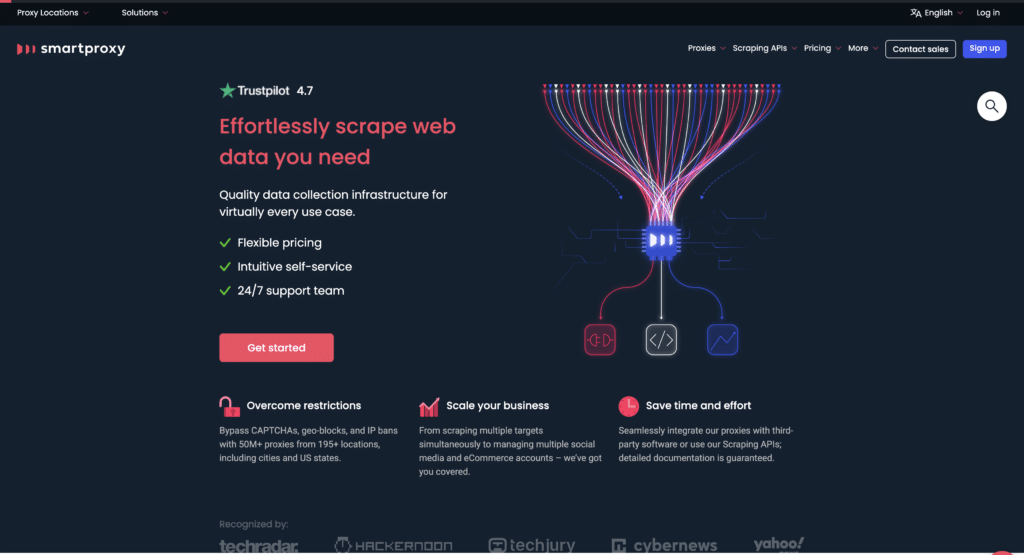
What is Smartproxy?
Smartproxy is a proxy service that helps data-driven businesses access publicly-available data. This service offers a range of proxy types, including residential, mobile, data center, and dedicated DC proxies. It boasts over 50 million proxies in total.
SmartProxy is one of the most popular proxy servers at TYB. In fact, we have multiple team members who use this service exclusively.
Smartproxy Features
- Over 40 million IPs
- Fast response time at <0.6 seconds
- 24/7 expert tech support
- Complete anonymity and strong security
- Unlimited threads
- Advanced rotation options
- 195+ locations
Smartproxy Pricing
SmartProxy offers a pay-as-you-go pricing option that provides much-needed flexibility for many users.
The price plans at SmartProxy depend on the type of proxy you’re looking for.
Residential proxies start at $12.50/mo for 1 GB and scale up to $400/mo for 50 GB.
Mobile proxies start at 2 GB for $50/mo, though you can access up to 25 GB for $500/mo.
If you’re looking for Datacenter proxies, plans start at 50 GB for $30/mo and scale to 1 TB storage for $500/mo.
Finally, Smartproxy offers Dedicated Datacenter proxies begin at $7.50/mo for 3 IPs, though you can work your way up to 200 IPs for $320/mo.
Smartproxy Pros and Cons
Smartproxy Pros
- The company prioritizes identity protection
- Many integrations available
- Multiple types of proxies
Smartproxy Cons
- Pricier than other options with few annual discounts and no free trial
IPRoyal
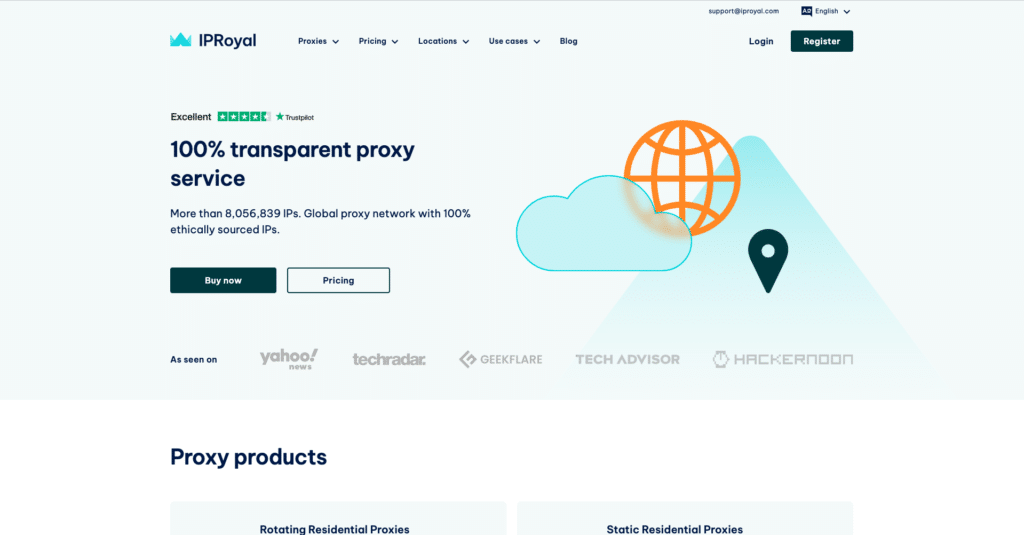
What is IPRoyal?
IPRoyal is an extensive proxy network with all sorts of proxy-related products available. This service offers residential proxies, private proxies, static residential proxies, data center proxies, and mobile proxies. On top of this, the service also comes with proxy managers and testers for Google Chrome and Firefox.
IPRoyal Features
- Automatic and frequent IP rotations
- Sticks IPs
- 4G for mobile proxies
- Unlimited concurrent connections
- Servers in the US and UK
- 24/7 expert support
- Supports reselling
- Particularly awesome for residential proxies
- Target specific cities and states
IPRoyal Pricing
To cover IPRoyal’s pricing, I will break it down according to the proxy type. IPRoyal offers different plans for each type.
Residential proxies: IPRoyal offers a sliding scale price-determination system for residential proxies. The fewer GB you purchase, the more expensive the price-per-gigabyte gets. For example, 500 GB is $1750 ($3.50/GB), but 20 GB is $52.50 at $5.25/GB.
Private proxies: There are three options for private proxies based on the number of proxies you purchase. 5 private proxies at $9/mo; 50 private proxies are $83.50/mo; 100 private proxies are $157/mo.
Static Residential proxies: These proxy price plans are available for one day (from $1.80/proxy), 30 days ($2.70/proxy), 60 days ($2.55/proxy), and 90 days ($2.40/proxy).
Datacenter proxies: These packages come with five proxies for $9/mo, 50 proxies for $83.50/mo, or 100 proxies for $157/mo.
Mobile proxies: IPRoyal offers mobile proxies for 90 days at $81/mo, 30 days for $90/mo, or one day for $7/day.
IPRoyal Pros and Cons
Pros
- Pay-as-you-go residential prices
- Residential proxies from real ISP-issued web connections
- No geo-restrictions
Cons
- Proxy speeds are lower than other companies
The Social Proxy
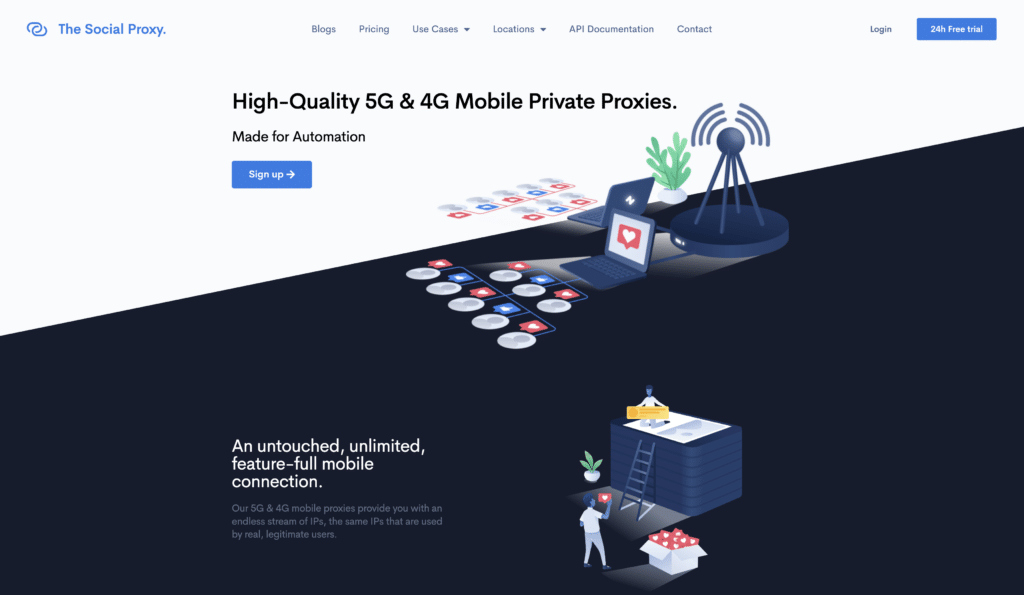
What is The Social Proxy?
The Social Proxy is a 4G and 5G proxy network designed specifically for managing social media accounts. The service also offers features for SEO and automation, making growing your accounts more straightforward than ever.
The Social Proxy Features
- Unlimited bandwidth and connections
- Unmodified 4G and 5G
- Sleek and intuitive dashboard
- Constant IP rotation
- Robust access logs
- Locations for New York, Texas, Austria, Germany, Israel, and the UK
The Social Proxy Pricing
The Social Proxy offers different price plans for the United States (Texas and New York) and the rest of the world. For U.S.-based users, 5G and 4G proxies are $130/mo. For the UK, Israel, Austria, or Germany, these proxies are $97/mo.
The Social Proxy Pros and Cons
Pros
- Easy and reliable proxy management
- Unmodified 5G available
- Automate social media and create multiple accounts
Cons
- Limited IP locations
NetNut

What is NetNut?
NetNut provides residential proxies for large-scale data collection. The service offers rotating and static residential proxies, mobile IPs, and data center proxies. It’s one of the more accessible options for data collection. However, it’s not as easy to use as Smartproxy.
Still, NetNut offers several exciting features that other proxy servers on this list don’t.
NetNut Features
- Over 52 million IPs with automatic rotation
- Combines ISP and P2P proxies
- Unlimited sessions
- No IP blocks
NetNut Pricing
The starting price for NetNut residential proxies is $300/mo — this plan comes with 20 GB. Customers can upgrade to a 50GB Advanced plan for $600/mo, a 100GB Production plan for $800/mo, or choose from professional options that start at $1625/mo.
NetNut Pros and Cons
Pros
- Constantly rotating IP pool
- Bypasses CAPTCHAs and reCAPTCHAs
- No geo-restrictions on content
Cons
- Slightly challenging to set up
SOAX
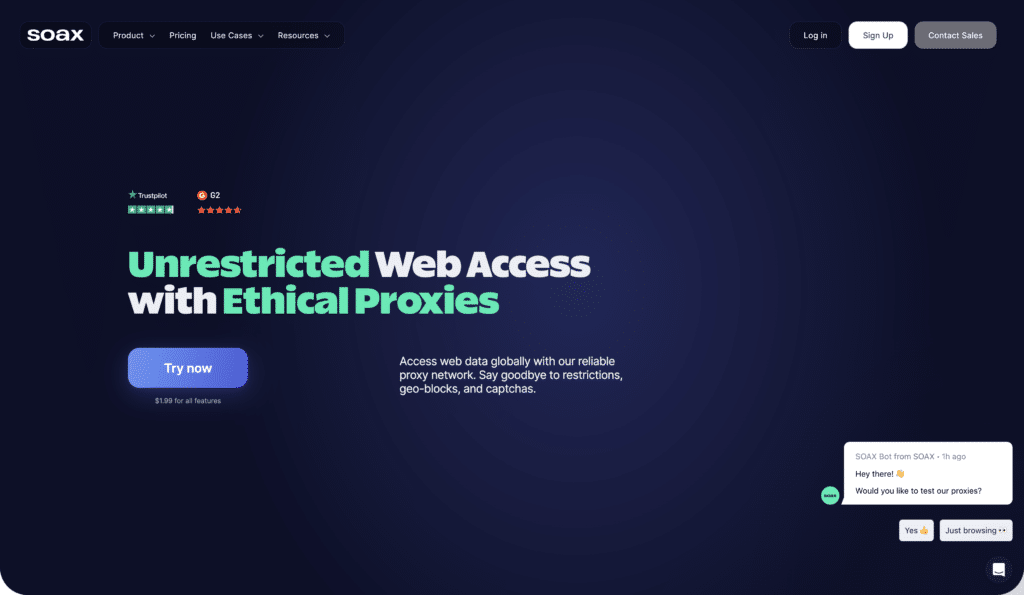
What is SOAX?
SOAX is an easy-to-use, affordable, basic proxy manager that works well for social media management. All SOAX IPs are whitelisted. Plus, the service offers great uptime and targeting by city or service provider.
SOAX is our favorite proxy platform for social media proxies at TYB.
SOAX Features
- Focus on residential proxies
- Flexible targeting by country, region, and even city
- 8.5 million IPs
- Flexible and customizable price packages
SOAX Pricing
SOAX only offers residential proxies. These plans start at $99/mo for 8GB traffic, going on to include 27GB for $300/mo, 55GB for $500/mo, and 100GB for $700/mo.
SOAX is for more than just small-scale users, though. The service offers Enterprise plans that allow you to scale well past 2,000 GB.
SOAX Pros and Cons
SOAX Pros
- Extremely straightforward usage
- Free trials and affordable pricing
- Less cost-per-GB than other providers
SOAX Cons
- Small IP pool
Rayobyte
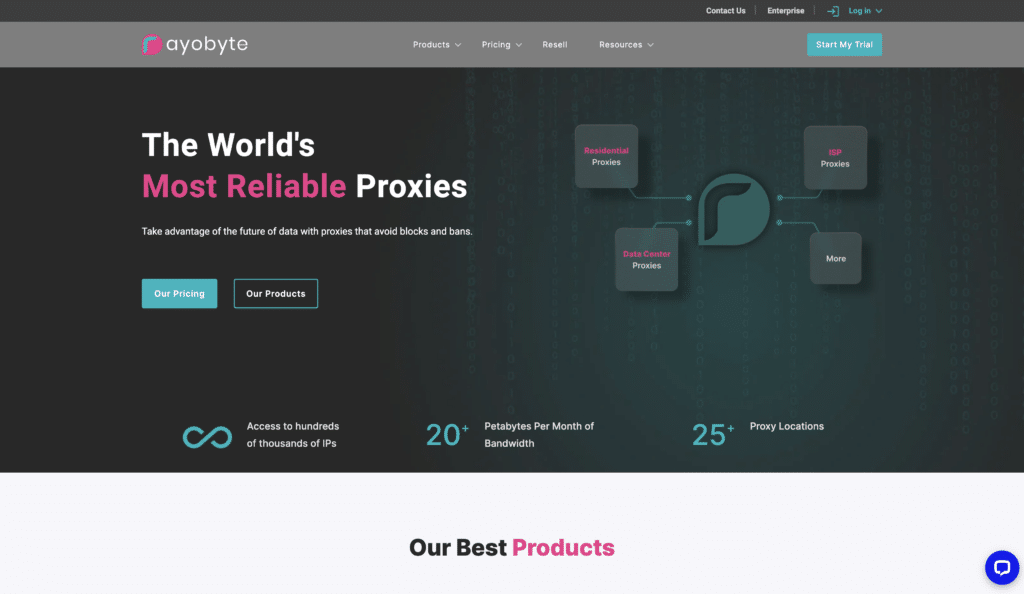
What is Rayobyte?
Rayobyte is an excellent proxy service provider for small-scale operations. The platform specializes in affordable mobile proxies, all with a proxy manager and support rotations for each request. If mobile proxies aren’t your thing, Rayobyte offers affordable residential, ISP, and data center proxies.
If you’re brand new to proxies or not looking to spend too much, Rayobyte is our suggested option out of all of the proxies on this list.
Rayobyte Features
- HTTP(S) protocol support
- Unlimited connections
- 25+ proxy locations
- Autorotations for each request
- 24/7 tech support
Rayobyte Pricing
Rayobyte offers different pricing options for their different proxies.
Residential proxy pricing starts at $1/GB for a custom plan and scales up to no more than $15/GB. For a semi-dedicated plan, ISP proxies are affordable, starting at only $2.50/mo. These options scale up to $5/mo for a starter plan with up to 99 IPs.
Regarding data center proxies, Rayobyte offers many options with Starter, Personal, Corporate, and Enterprise plans. The service prices these plans according to the amount and quality of IPs in the package. None of the costs are above $5/IP.
Finally, Rayobyte offers mobile proxy options. Mobile proxies tend to be the most expensive proxy type, but Rayobyte prices are still hard to beat. The plans include Starter ($50/mo), Business ($300/mo), and Enterprise ($600/mo).
Rayobyte Pros and Cons
Rayobyte Pros
- Monthly and annual commitments not required on some plans
- Low prices
- Free trial with up to 50 MB included
- Excellent beginner option with great customer support
Rayobyte Cons
- Fewer proxy locations than other providers
- Small proxy pool
Oxylabs
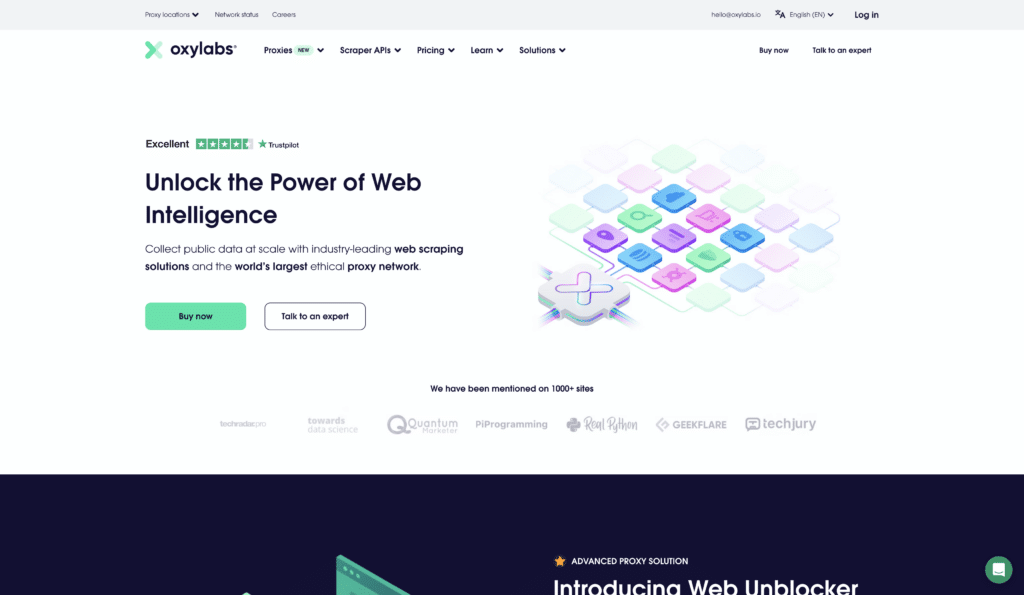
What is Oxylabs?
The last provider I mentioned is ideal for small-scale operations, so it only makes sense to include a large-scale, robust provider on this list: Oxylabs.
Oxylabs offers a large selection of proxy types, but their services don’t stop there. The company also provides the following:
- Stellar data collection APIs.
- A proxy rotator.
- An Android app.
- An easy-to-use browser extension.
Oxylabs is one of the best providers on this list, particularly for social media scraping and account growth. Despite the massive capabilities of their proxy tools, their dashboard is intuitive and not too tricky for beginners. Oxylabs also has an impressively large data pool, which ultimately helps them rank as a TYB favorite.
Oxylabs Features
- 100+ proxy pool for residential proxies
- Steady success rate at 99.95%
- Quick response time at .6s
- Unlimited sessions available
- Simple, beginner-friendly dashboard
- Follows HTTP and HTTP protocols
Oxylabs Pricing
Oxylabs offers more proxy options than most providers on this list. Each proxy has different price packages, so here’s a quick overview.
Oxylabs residential proxies work on a pay-as-you-go basis. Alternatively, you can opt for a Starter plan at $300/mo, Advanced at $600/mo, or Premium at $800/mo.
Mobile proxies start at $250/mo and scale up to $1,700/mo for an Enterprise plan.
If you’re interested in rotating ISP proxies, the prices start at $340/mo and scale to $6,000/mo for Enterprise plans.
One of the most affordable options is the data center proxy packages, which begin at $50/mo and don’t get more expensive than $300/mo.
Alternatively, dedicated data center proxies (which offer faster response times and better uptime) begin at $180/mo and stop at Enterprise plans for $6,000/mo.
Lastly, Oxylabs has the unique addition of SOCKS5 proxies for anywhere between $180/mo and $6000/mo.
Oxylabs Pros and Cons
Oxylabs Pros
- Pay-as-you-go residential proxies
- Yearly discounts
- Robust feature load
- Large selection of proxy types
- 100 million IP pool
Oxylabs Cons
- Limited bandwidth on residential IPs
BeeProxy
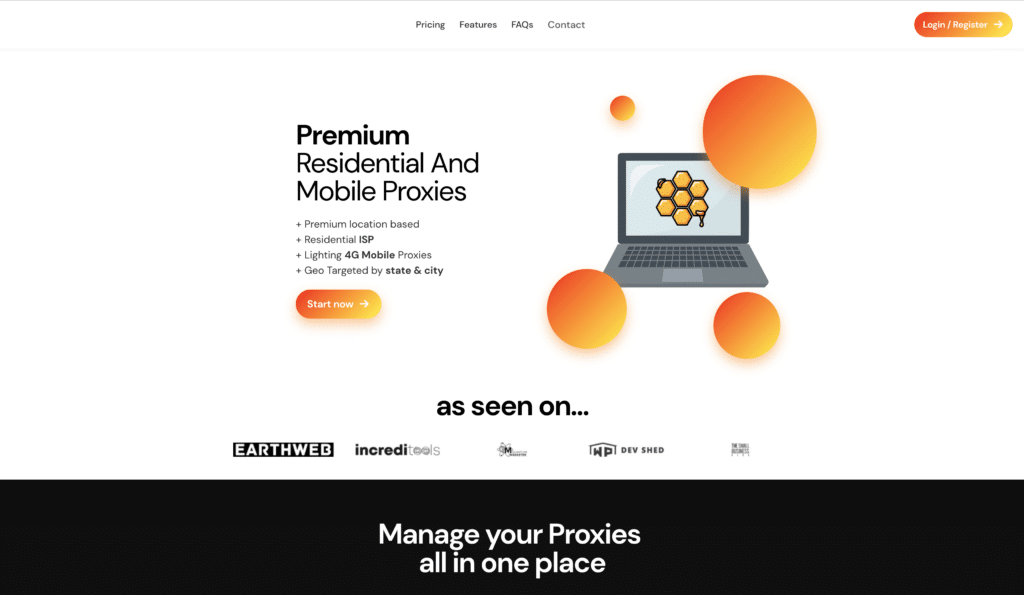
What is BeeProxy?
BeeProxy is an affordable, secure, and beginner-friendly proxy provider with geo-targeting features for a generous mix of proxy types.
Beeproxy offers residential ISP and 4G mobile proxies. They don’t offer as many different types as other providers on this list. Still, their specialization in these two types helps to ensure top-quality service and a generous feature selection.
BeeProxy Features
- Geo-targeting
- Total anonymity with IP rotations
- Consistently fast speeds
- No minimum commitment on plans
- Custom locations available
- Sleek dashboard
BeeProxy Pricing
BeeProxy offers extremely straightforward pricing. For residential proxies, users pay per GB, starting at $18/GB. The same applies to mobile proxies, but these start at $30/GB.
BeeProxy Pros and Cons
BeeProxy Pros
- 30-day money-back guarantee
- Affordable pricing
BeeProxy Cons
- Not as many proxy types as others on this list
- IPs don’t automatically rotate
What is a Proxy?
A proxy is a web server that works as an intermediary between an application or a browser and a user’s actual server. Proxies retrieve web or app information on behalf of a client without revealing any personal information about the client to the webpage or application they’re using.
As such, proxies function primarily as an additional form of data security that can protect their users from online attacks. However, proxies have all sorts of other uses beyond security and attack protection.
Proxies allow web users to browse anonymously, bypass geo-blocking limits, and regulate their web requests. They’re also great for marketing purposes, enabling users to scrape apps and web pages for valuable information about their audience and clientele.
But how do proxies actually work?
They facilitate requests and responses between online servers and their users. Without a proxy, a user’s online requests go directly between their browser (via their IP address) and a web server. Then, the server sends a response directly back to the user’s browser and IP.
Proxy servers, alternatively, conceal the user’s actual IP address and use a different IP on the user’s behalf. The result is no longer direct communication between the user and the web server — instead, the proxy server first receives the user’s requests, then forwards them to the web server. The server’s response must then go through the proxy server to return to the user.
There are multiple varieties of proxy servers, each with slightly different strengths and functions. The ones I’ve discussed for this article are:
- Mobile proxies
- Residential proxies
- Datacenter proxies
- IP location/source proxies
I’m going to get into the details of each of these proxies a bit later in the article. For now, let’s look at some more general questions.
Free Vs. Paid Proxies
All of the proxies I’ve mentioned thus far are paid proxy services. If you’re brand new to the proxy world, you’re probably wondering: are free proxies available? Indeed, they are.
Most people opt for paid proxies due to benefits like controlling caching efficiency, connection speed, response time, etc. In the case of a proxy failure, your service provider is there to help you.
However, paid proxies can be expensive and still break down. Here’s a look at free proxies, their benefits, and their weaknesses.
Free Proxy Pros
- You can achieve web anonymity through a chain of free proxies
- Features like connection rate and response time are generally worse with free proxies
- No extra expense
Free Proxy Cons
- Using multiple proxies can negatively impact your web connection rate
- Free proxies face more connection failures than paid proxies
- Difficult to find properly operating free proxies
Why Use a Proxy?
Proxies offer anonymity that allows web users to conduct operations they may not usually be able to carry out with their normal IP address. Here are some primary proxy uses.
Scraping
Web scraping, also known as web harvesting or web data extraction, is a way to access information from any website without having to browse and collect it manually.
This web search method helps you quickly locate and extract relevant data to your marketing strategy, brand goals, or general web performance. Scraping works for social media as well as standard web pages. This research lets you quickly correct titles, hashtags, post comments, account followers, emails, and more.
Rotating proxies or high-level APIs allow for the most in-depth scraping results, though small-scale scraping can still accomplish excellent results.
Proxies allow users to make multiple web requests simultaneously, which is why scraping with them can be so efficient.
Unblocking
Proxies also allow users to access web pages, content, and apps blocked from their normal IP address. The reason some content is blocked can range from anything, including the country you’re in, or something as simple as a paywall.
Blocked content, especially on top-rated apps like TikTok, can cause significant issues if you’re trying to market your brand online. Proxies help users avoid this issue by creating access from a country that the user isn’t in — instead, the IP address they’re masking as is. Rotating or residential proxies can help you protect your data while accessing blocked content.
Accessing More Content
Similar to how proxies allow users to access blocked content, they can also help to access more content. You can access web content outside of locational/regional filters or target audiences with a rotating or residential proxy. This access is also excellent for scraping, as you’re no longer limited to an app or webpage’s algorithms.
Booting Automation
Automation software can make growing your social media presence more manageable than ever before. For example, software like Ninjatok and Toksocial create bots that allow you to mass-follow, like comments, and leave feedback without manually having to engage.
Proxies stop TikTok from detecting this behavior as coming from a bot, which would otherwise result in your account getting blocked or banned.
Proxy Vs. VPN: What’s the Difference?
I mentioned earlier that proxies and VPNs are highly similar. However, they come with specific differences and distinctions.
A common rumor around proxies and VPNs is that proxies are safer than VPNs. This isn’t exactly true. In debunking this rumor, I will cover some of the other major differences between the two.
Are Proxies Safer than VPNs?
In short, proxies are not necessarily safer than VPNs. In fact, many free proxy sites can be just as dangerous as a public network. Proxies offer more features than VPNs, but VPNs provide more layers of safety and protection than proxies do. This is because they heavily encrypt all your data, making it practically impossible for hackers to track or steal your information.
When it comes to speed, proxies offer more advantages. They are better at bypassing firewalls and are generally faster than many VPNs on the market.
At the end of the day, your choice between a proxy and a VPN should depend on your needs. For example, if your goal is to access geo-restricted content or hide your IP address from a particular website, then using a proxy might be enough to get the job done. On the other hand, if you’re only looking for maximum security, VPNs tend to offer extra privacy.
The most significant difference between proxies and VPNs is that proxies protect only specific apps or your browser, while VPNs protect all data going to and from your device.
Do Proxy Sites Block Your IP?
Proxies hide your IP by masking it with a different IP address or, in the case of rotating IPs, a host of different ones. You can change your IP with both VPNs and proxies.
Different Types of Proxies
So, what are the different types of proxies, and what purposes do they offer?
Residential Proxies
Residential proxies are affiliated with an ISP (Internet Service Provider), meaning their IP addresses come from a physical location. These are highly similar to VPNs.
Residential proxies tend to be more costly than many other proxy types because they’re more widely trusted by web servers due to their physical location ties. As such, they’re the most reliable proxy type on this list. By “reliable,” I mean they’re least likely to be detected by web servers.
There are two types of residential proxies: static proxies and rotating proxies. Static proxies assign users to a singular residential address. These proxies are more easily accessible to hackers and easier to trace as they work through one single source. Rotating proxies, on the other hand, assign users a different IP address with each use case. Their ever-changing nature makes them difficult to track.
Mobile Proxies
Mobile proxies get their IP addresses from devices that are connected to mobile data (3G, 4G, and 5G). These devices are primarily smartphones, but can also include tablets. Mobile proxies allow users to appear as if they’re using a mobile device while working from a laptop or desktop computer.
This type of proxy is best for tracking ads and app testing. These are also the best proxies for growing and monitoring social media accounts.
Dedicated Proxies
Dedicated proxies are, simply put, proxies that are used by one user or device. This is the way to go if you need to keep an IP address for a long time. These proxies are also often called private proxies.
Socks5 Proxies
Socks5 proxies are one of the most popular proxy types on the market, but they can initially be a bit difficult to understand.
They tend to be cheaper than many other proxy types and offer a great balance between speed and security. They’re a type of middle ground between VPNs and other types of web proxies.
These proxies get their IP addresses from PCs that are connected to the internet. These PCs can be located in remote locations or even in your own home. The best part about Socks5 PC proxies is that they keep no logs of user activity, making them more secure than other proxies.
SOCKS stands for Socket Secure. The “5” comes from the proxies that are “layer 5 protocols,” meaning they sit between SSL and TCP/UDP. These proxies can handle HTTP, HTTPS, POP3, SMTP, and FTP requests.
Socks5 proxies follow a network protocol that communicates with servers via a firewall. These communications are called TCPs, or Transmission Control Protocols.
Socks5 proxies can route any traffic that comes from any programs or protocols. These are highly secure proxies, as they relay traffic using SSH (Secure Shell) encryptions.
Shared proxies are much more straightforward to understand than SOCKs5 proxies. A “shared proxy” refers to an IP address that’s used and controlled by multiple users at the same time. These IPs can be static or rotating.
Shared proxies tend to be slower than other types of proxies, as multiple people use their resources simultaneously. There’s also always the chance of an IP you’re using getting banned due to someone else’s misuse.
You have less control with shared proxies, but they tend to be much less expensive than other proxy types.
Semi-Dedicated Proxy
Semi-dedicated proxies are a middle ground between dedicated proxies and shared proxies. In this case, up to three people share a proxy and IP address. These don’t offer exclusivity, but they offer faster speeds than shared proxies and lower costs than dedicated proxies.
Semi-dedicated proxies provide a great balance between cost and reliability. Since these types of proxies have fewer users assigned to one single IP address, there’s less chance that web servers will detect them each time they’re used.
Reverse Proxy
A reverse proxy server forwards client requests (e.g., from a web browser) to web servers. It is placed in front of the web servers to improve security, performance, and reliability.
A reverse proxy is unlike a forward proxy because it is positioned differently. In a forward proxy, the proxy is located in front of the clients. However, in a reverse proxy, the proxy is set at the network edge, intercepting client requests destined for a website’s origin server. The reverse proxy server then communicates with the origin server to obtain and return the requested information.
To simplify, a forward proxy protects a client by ensuring that no origin server directly communicates with it. Whereas, a reverse proxy safeguards an origin server by ensuring that no client can directly communicate with it.
Other Content You Might Like
Checkout our other proxy-related articles!
Wrap Up
Well, that about covers proxies — for now.
I hope this post has given you a better understanding of the different proxy types, how they work, their differences and advantages compared to VPNs, and our favorites here at TYB.
If you have any further questions or think I missed anything important, don’t hesitate to leave a comment below.
Thanks for reading, and until next time!

